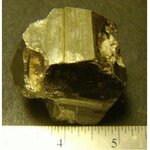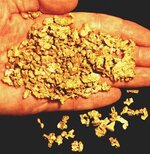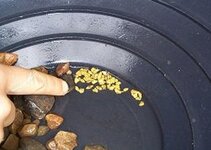Kilika
Full Member
Hi Y'all- I'll appreciate in advance any responses I get from this post!
Only had my Ace 250 about 3 weeks now, been out about 5 or 6 times, already burned through my first set of batteries but still don't know much about what I'm doing in the field.
So I went up in the west side of the Cascades, found a stream with about a 30% grade (I hope) near an area that had gold in the past. There were two man-made barriers made of timbers stacked up, one on one side of the stream, one on the other side several yards downstream. Quite alot of sand and silt behind them, assume they were put there to try to keep everything from washing downstream. A little further downstream, a large culvert was about 1/2 full of sand/silt. Went over the area with my Ace on factory settings. A few strong signals, but when trying to pinpoint, got strong signals covering large areas (1'x2'), anywhere from 2" to 8" deep. Started digging. No found objects, but the deeper I got, the more little gold specks I was seeing.
So here's some of my questions - would a layer of fool's gold give me a reading like that? I tried panning some of it, but I don't know what I'm doing with a gold pan, yet, either. Never gotten any gold 'in the wild', so I don't really know what that would look like. Isn't fools gold made of iron pyrite? Or something like that? I've read on this forum that the Ace 250 doesn't do well with wet sand... was that what was happening? And what does that mean? What does it do that's weird, in wet sand? Or is that only a problem around salt water? Maybe it was just reacting to some other minerals in the area?
Never gotten any gold 'in the wild', so I don't really know what that would look like. Isn't fools gold made of iron pyrite? Or something like that? I've read on this forum that the Ace 250 doesn't do well with wet sand... was that what was happening? And what does that mean? What does it do that's weird, in wet sand? Or is that only a problem around salt water? Maybe it was just reacting to some other minerals in the area?
I dug down as deep as I could reach with my little garden trowel (up to my shoulder in the hole) through alot of sand, under some big rocks(about fist-sized), down through some more gravel to where I seemed to be getting some distinct layers. Took about 1/2 of a 5gal. bucket home with me. Was getting a reading on the stuff I took home, and will try panning it later with a friend who has a little(tiny) bit more experience than I do.
(up to my shoulder in the hole) through alot of sand, under some big rocks(about fist-sized), down through some more gravel to where I seemed to be getting some distinct layers. Took about 1/2 of a 5gal. bucket home with me. Was getting a reading on the stuff I took home, and will try panning it later with a friend who has a little(tiny) bit more experience than I do.
Any advice, tips, or information you care to share would be great!
Thanks-
Kilika
Only had my Ace 250 about 3 weeks now, been out about 5 or 6 times, already burned through my first set of batteries but still don't know much about what I'm doing in the field.
So I went up in the west side of the Cascades, found a stream with about a 30% grade (I hope) near an area that had gold in the past. There were two man-made barriers made of timbers stacked up, one on one side of the stream, one on the other side several yards downstream. Quite alot of sand and silt behind them, assume they were put there to try to keep everything from washing downstream. A little further downstream, a large culvert was about 1/2 full of sand/silt. Went over the area with my Ace on factory settings. A few strong signals, but when trying to pinpoint, got strong signals covering large areas (1'x2'), anywhere from 2" to 8" deep. Started digging. No found objects, but the deeper I got, the more little gold specks I was seeing.
So here's some of my questions - would a layer of fool's gold give me a reading like that? I tried panning some of it, but I don't know what I'm doing with a gold pan, yet, either.
 Never gotten any gold 'in the wild', so I don't really know what that would look like. Isn't fools gold made of iron pyrite? Or something like that? I've read on this forum that the Ace 250 doesn't do well with wet sand... was that what was happening? And what does that mean? What does it do that's weird, in wet sand? Or is that only a problem around salt water? Maybe it was just reacting to some other minerals in the area?
Never gotten any gold 'in the wild', so I don't really know what that would look like. Isn't fools gold made of iron pyrite? Or something like that? I've read on this forum that the Ace 250 doesn't do well with wet sand... was that what was happening? And what does that mean? What does it do that's weird, in wet sand? Or is that only a problem around salt water? Maybe it was just reacting to some other minerals in the area?I dug down as deep as I could reach with my little garden trowel
 (up to my shoulder in the hole) through alot of sand, under some big rocks(about fist-sized), down through some more gravel to where I seemed to be getting some distinct layers. Took about 1/2 of a 5gal. bucket home with me. Was getting a reading on the stuff I took home, and will try panning it later with a friend who has a little(tiny) bit more experience than I do.
(up to my shoulder in the hole) through alot of sand, under some big rocks(about fist-sized), down through some more gravel to where I seemed to be getting some distinct layers. Took about 1/2 of a 5gal. bucket home with me. Was getting a reading on the stuff I took home, and will try panning it later with a friend who has a little(tiny) bit more experience than I do.Any advice, tips, or information you care to share would be great!
Thanks-
Kilika


 It just occurred to me... when I scanned the stuff in the bucket and got a reading on it... the bucket I was using had a metal handle!
It just occurred to me... when I scanned the stuff in the bucket and got a reading on it... the bucket I was using had a metal handle!  Well, maybe someone can learn from my mistakes!!
Well, maybe someone can learn from my mistakes!! 



 too light, and too brittle.) But I did find a few flakes that were a deeper gold color and didn't lose their lustre when turning in the light. Also had black sand. Can gold and mica be found together? Probably not too likely. I know a local jeweler that does alot of custom manufacturing. I may take some into him... at least he'll get a good laugh
too light, and too brittle.) But I did find a few flakes that were a deeper gold color and didn't lose their lustre when turning in the light. Also had black sand. Can gold and mica be found together? Probably not too likely. I know a local jeweler that does alot of custom manufacturing. I may take some into him... at least he'll get a good laugh  . If you can obtain a drop or two, it will bond with the gold but it won't with the mica or pyrite. Just be careful where you burn off the mercury to recover the gold.
. If you can obtain a drop or two, it will bond with the gold but it won't with the mica or pyrite. Just be careful where you burn off the mercury to recover the gold.
